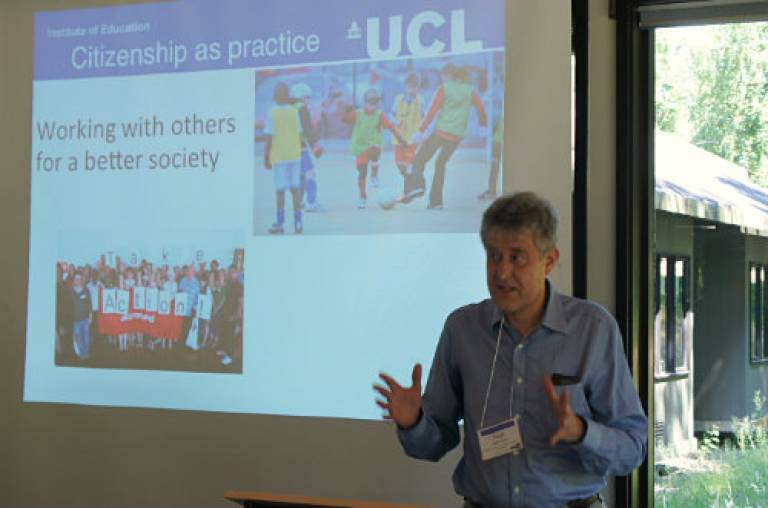Q&A with Professor Hugh Starkey
24 February 2016

Professor Hugh Starkey (UCL Institute of Education) talks about his new strand on the Global Citizenship Programme, 'Active Citizenship' which launches this year.
What are you working on at the moment?
This week I am preparing for the first run of a new programme being offered as part of the Global Citizenship Programme after summer exams and for my keynote lecture on an online course.
My programme is called Active Citizenship and we are offering it to 60 second and final year undergraduates and students on taught master’s programmes. It runs from 31 May to 10 June 2016 alongside three other Pathways strands that focus on Enterprise, Voluntary Sector and Employability. What is special about Active Citizenship is that it has a campaigning focus and an explicit small p political dimension. Participants will be offered training in campaigning skills and will be linked to an established organisation to take forward one of their campaigns. They will work in teams and they will make, at least, a short video and a poster. We expect them to have opportunities for blogging, communicating through social media and even lobby.
To set this all up I am fortunate to have an excellent project manager, Mai Abu Moghli, who is a doctoral student at IOE and we had a meeting this week with a number of organisations that are enthusiastic about hosting UCL students and helping them develop their campaigning skills. We can’t yet confirm the list of organisations that will host, but to give you an idea we have been talking to Age UK, Amnesty International, Anti-slavery, Citizens UK, Howard League for Penal Reform, Oxfam, War on Want as well as UCL-based campaigns and environmental movements.
My other major preoccupation this week is preparing to give a keynote lecture entitled: Learning to Live Together: children’s rights, identities and citizenship for an online programme coordinated by Dr Karen Edge working with IOE’s Centre for Doctoral Education. The programme is entitled: Democracy, Human Rights and Democratic Education in an Era of Globalization and the taught element consists of 12 two hour sessions with 30 students from UCL, Melbourne Graduate School of Education, Australia and Ontario Institute for Studies in Education of the University of Toronto.
Through the Adobe Connect platform they listen to a keynote guest lecture and this is followed by online groupwork in mixed groups so there are discussions going on across the 3 continents. A team of tutors from the three universities supports the sessions to make sure everyone is able to participate and ask questions. This initiative grew out of an attempt to develop a face to face doctoral course between three universities, but the subsidies required to support the course, including travel bursaries for the students, dried up and this online programme gives at least an opportunity for structured engagement with peers from different university systems. Of course the groups of students in each centre already include a wide diversity of national, cultural and religious backgrounds.
What advice would you give to someone looking to develop the way they teach?
My advice is to speak to colleagues. There is a lot of exciting and innovative teaching going on at UCL and this is highlighted in the Teaching and Learning newsletter and in the annual teaching and learning conference. Quite informal conversations may throw up hints and tips that may be relatively easy to implement. For example, I discovered that a colleague was including Skype lectures from quite eminent people from other universities in and beyond the UK. They were able to bring the authors of weekly readings into the seminar.
How do you expect higher education to change in the next five years?
There will be a greater emphasis on teaching as being as important as research. I think UCL’s policy of ensuring that students engage with research throughout their time with us and ensuring that teaching is based on research is a great principle and one that will take a considerable effort to work through.
What piece of technology do you find invaluable in your teaching?
In face to face teaching it is really helpful to have data projectors connected to the internet. Almost all our rooms at IOE have this now. I keep documents and PowerPoints on Moodle and can then upload them to show to the class.
What achievement are you most proud of?
I invite visiting academics to audit an undergraduate course I teach entitled Education, Values and Society. Over the past few years several colleagues from China have attended and in October 2015 I was invited to deliver an intensive version of the course at Beijing Normal University. Given that the basis of the course is human rights education, I wondered whether there would be any constraints on debate in the classes. In fact the 40 students happily agreed to move the furniture to make a cafeteria style classroom and they engaged in lively and, it appeared, uninhibited debate and discussion.
Dr Frank Witte (UCL Economics) asks: “What, when you came here, was the most surprising thing about UCL?”
I believe in the importance of networking and discussions between colleagues. I have found that you have to work very hard at this because it is often very difficult to get colleagues together for meetings. This is because people are often involved with several teaching programmes with conflicting demands and also many academic colleagues cannot afford to live in London and they have very full diaries on the days they are in the university.
What question would you like to pose to the next interviewee?
What advice do you have about using your time most efficiently in teaching and assessment?
Do you work at UCL? Would you like to be featured here? Email teaching.learning@ucl.ac.uk
 Close
Close

